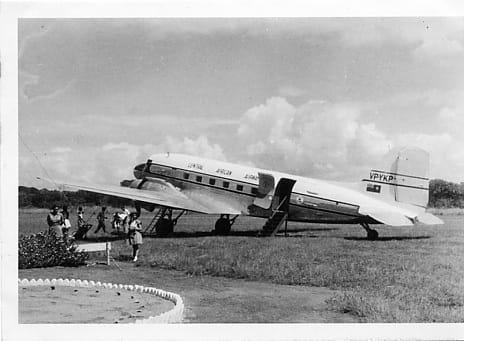A Hirsch Holiday

A Hirsch Holiday
Southern Rhodesia (now Zimbabwe) is landlocked. Geographically it had always been well defined naturally, with great rivers bordering it, north and south. To the west was semi-desert and to the east the beautiful Eastern Highlands falling away to Portuguese East Africa (PEA) and the sea.
Everyone went hunting, or more often fishing, on the weekends to the local watering spots. Tiger fishing was the ultimate sport fish, but there was bream for good eating and 75 lb. vundu, the bottom feeders, to be landed. But we never had these normal kinds of weekends.
A Hirsch Holiday
Once a year, every family made a point to see the sea. The nearest place was East: Beira in P.E.A, at the estuary of the Pungwe River, the road and rail well travelled. Rhodes himself had mapped the rail route. It had come at a price: four hundred men, mostly East Indians, had lost their lives in building it before the turn of the twentieth century, not that anyone remembered. Beira was a wild sea port and families went there for a cheap holiday to eat piri-piri prawns, and piri-piri chicken swallowed down with lots of beer or unbelievably cheap Portuguese wine on picnics at the beach or at the sidewalk cafes. Teenage boys would drive down in the school holidays for the freedom to experience all sorts of forbidden firsts.
Those that could afford it went South to the crowded beaches of Durban on South Africa’s south coast. Here the freedoms were not so great under the strict rule of the Dutch Reformed Church: bars closed at midnight on Saturdays. Sundays were dry and the colour bar restricted all the liberties to be had in PEA.
Our family never did these normal kinds of holidays. There always had to be some objective in mind. After Federation (of the two Rhodesias and Nyasaland in 1953), Dad decided we really ought to explore the newly acquired poor relation. So, while everyone went south or east to the sea, we flew north on newly formed Central African Airways to the poorest place on the continent: Nyasaland, landlocked too, but sporting the last of the Great Rift Valley Lakes, the continent’s second deepest lake. Our arrival at Lilongwe Aerodrome was a bumpy one along the grass before coming to a stop roughly in the vicinity of a single wind sock marking the place. Several Natives came out of nowhere to help us with our baggage to load a single VW combi waiting specially to take us to the shores of Lake Nyasa.
We were far from the madding crowds of Durban or Beira. There were only ten guests, including our family of five. We sailed in an Arab dhow. We paddled about in a dugout canoe. We lashed together a raft of poles and floated effortlessly to an island: the challenge was getting back. We goggled with our masks and snorkels at fish of all shapes and sizes and colors of the rainbow, at fish that looked like plants and plants that looked like fish: the habitat of more species of fish than anywhere else on earth.
The water was warm and the air was balmy. The hotel waiters with red fezzes and white starched uniforms folded the stiffly starched serviettes a different way every meal for the entire time that we were there. We wished we could say the menu was as varied.
The most interesting guest was an old elephant hunter, full of wonderful yarns. Dad soon yearned for the newspapers: the Salisbury Herald, the Johannesburg Star, the London Financial Times. Did anyone know if he could get any of these in Lilongwe, Nyasaland’s administrative center? Nobody had any idea. In no time he commandeered the combi and we were taking the trip back into the vast interior to see what we could see and find a newspaper or two.
There wasn’t much in Lilongwe, as had been reported, besides lots of dried fish for the locals and curios for sale at every corner with not a customer in sight. There were tea plantations dotted about the hill sides here and there but not a cup of tea to be had.
Unlike the rest of Africa there was no song here, the people surly. It seemed its only two resources were its extraordinary tourist potential and its political assertiveness.
We returned to paradise, but not before Dad had decided to cut the holiday short and get back to work. He had seen enough. It did not bode well for the future.

